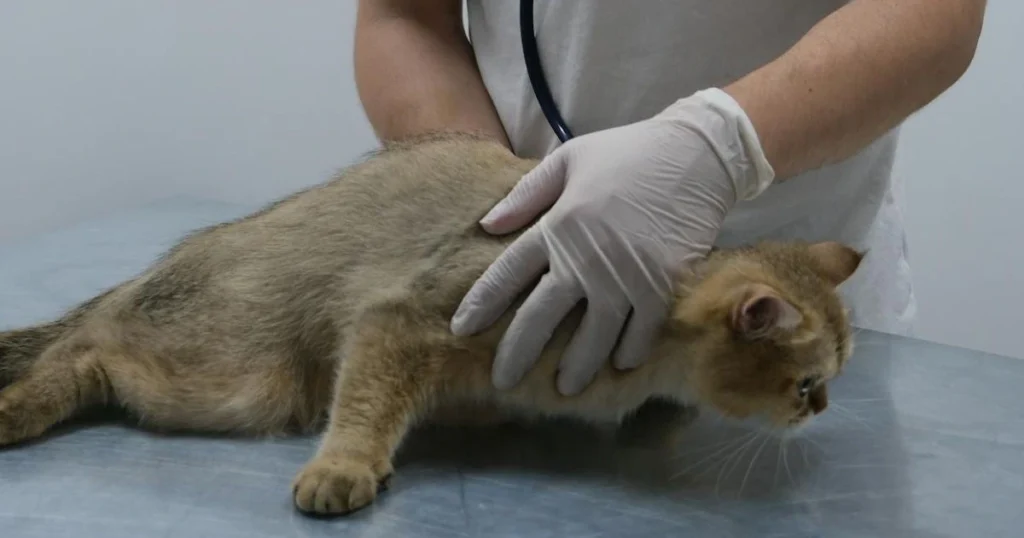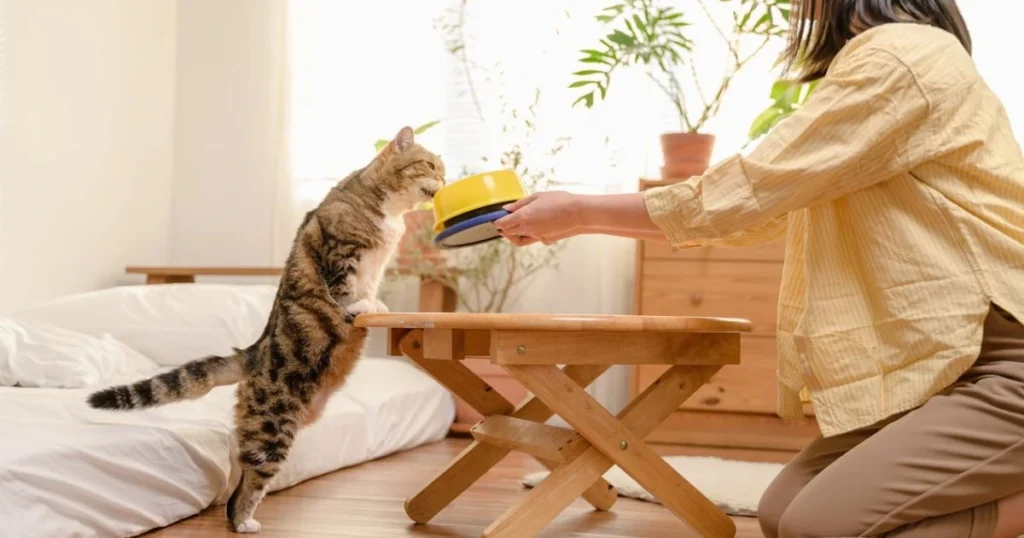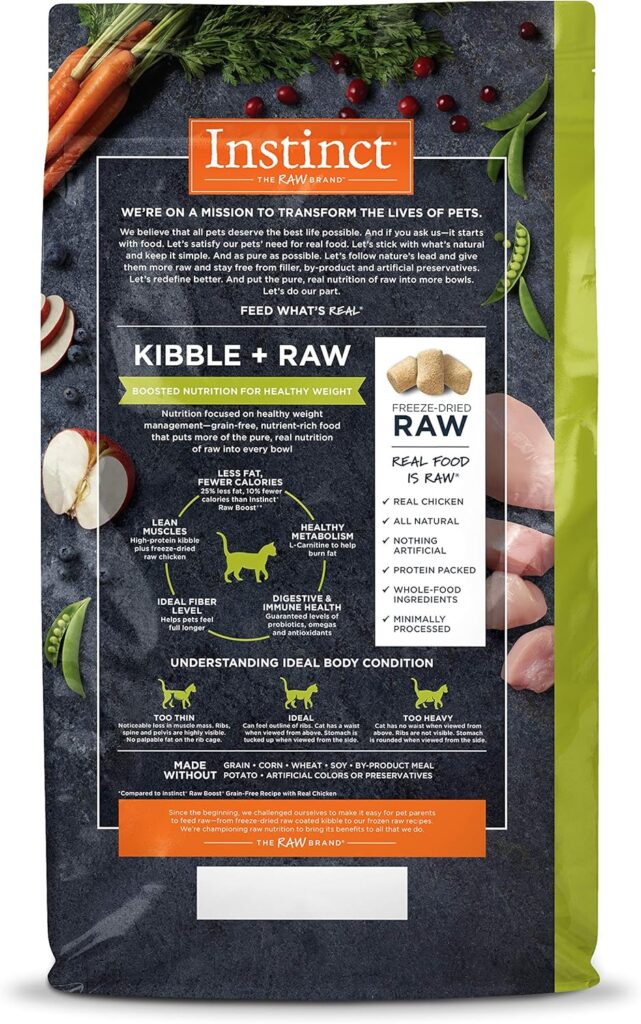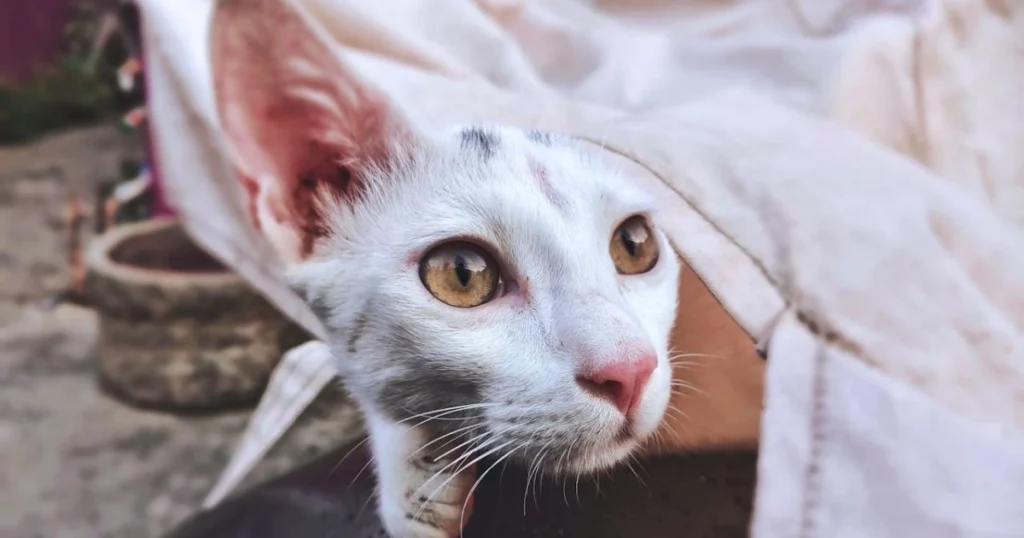Seeing your cat look thin and frail is heartbreaking. Underweight cats often face health issues that affect their quality of life. But, with the right care, you can help your cat regain a healthy weight and thrive.
In this guide, we’ll look at the signs, causes, and solutions for underweight cats. This will help you understand and address the problem effectively.
Cats hold a special place in our hearts, and their well-being is crucial. Whether your cat is a kitten or a senior, knowing about feline nutrition and weight management is key. This article will give you the insights you need to care for your underweight cat.
Identifying an Underweight Cat
Keeping your cat at a healthy weight is key for their happiness and health. With many cats being overweight or obese, it’s important to spot an underweight cat. Knowing how to use the body condition score and look for signs can help your cat stay at the right weight.
Body Condition Score
The body condition score (BCS) is a tool vets use to check a cat’s weight. It ranges from 1 (severely underweight) to 5 (obese), with 4 being just right. To check your cat’s BCS, feel their ribs, spine, and hips. An underweight cat’s bones will stick out a lot, with hardly any fat around them.
Visible Signs
- Prominent ribs, spine, and hip bones: An underweight cat’s bones will be easy to see, with little fat covering them.
- Loss of muscle mass: Underweight cats might look “sunken” or “concave,” especially in the back and shoulders.
- Lack of abdominal fat pad: Healthy cats have a slight belly curve, but underweight cats will have a flat or concave belly.
- Visible waistline: From above, an underweight cat’s waistline will be clear, with little fat in the belly area.
By checking your cat’s body condition and looking for signs of being underweight, you can keep them healthy. It’s also wise to talk to your vet for a weight management plan tailored to your cat.
Causes of Weight Loss in Cats
Keeping your cat at a healthy weight is key to their happiness. If your cat is losing weight without reason, it might mean they have a health problem. Let’s look at some common reasons for weight loss in cats.
Insufficient Caloric Intake
Not getting enough calories is a big reason for weight loss in cats. This can happen if your cat doesn’t like their food, if their diet changes, or if they don’t eat enough. It’s important to feed your cat a balanced, high-quality diet to keep them from losing weight.
Stress and Anxiety
Stress and anxiety can also cause weight loss in cats. Big changes, like moving or getting a new family member, can stress them out. This stress can make them lose their appetite and lose weight.
Dental Problems
Dental issues, like painful teeth or gums, can make eating hard for your cat. This can lead to less eating and weight loss. Regular dental care is key to keeping your cat healthy and preventing weight loss.
Knowing why your cat might be losing weight is the first step to fixing it. By finding and fixing the problem, you can help your cat get back to a healthy weight and stay happy and healthy.
Underweight cats
We all want our cats to be healthy and happy. Keeping them at a proper weight is key. Underweight cats face many health problems, so it’s important to spot the signs early.
Checking if a cat is underweight involves a body condition score. This looks at the cat’s fat and muscle. Most cats weigh between 3.5 to 5 kilograms, but this can vary.
Older cats, especially those over 12, may lose weight naturally. But, weight loss can also signal health issues like diabetes or cancer. It’s vital to get your vet’s help to find and treat the cause.
Rescue cats often come in underweight due to past malnutrition or illness. They need a slow and careful weight gain plan to stay healthy.
If your cat is underweight, your vet can help them gain weight. They might suggest a high-calorie diet or appetite stimulants. A stress-free home and good dental care also help with weight management.
Medical Conditions Contributing to Weight Loss
Underweight cats can face many challenges, including not eating enough, stress, or dental problems. But, there are also serious health issues that can lead to weight loss. It’s important to understand these health problems to find the right treatment.
Gastrointestinal Issues
Inflammatory bowel disease (IBD) and other GI problems can make it hard for cats to absorb nutrients. This can cause weight loss. Signs include chronic vomiting, diarrhea, and not wanting to eat. To help underweight cats, it’s key to diagnose and treat these issues with the right diet and medicine.
Hyperthyroidism
Hyperthyroidism is when a cat’s thyroid gland works too hard. This speeds up their metabolism, making them hungry but still losing weight. Regular vet visits and the right treatment, like medication or surgery, can help manage this condition and help cats gain weight.
Feline Diabetes
Feline diabetes is a metabolic disorder that can cause weight loss. Cats with this condition may drink more, pee more, and lose muscle, leading to unintentional weight loss. Managing feline diabetes with insulin, diet changes, and vet care is crucial for underweight cats to regain a healthy weight.
Spotting these medical conditions is the first step to addressing weight loss in cats. Getting quick vet help and following the treatment plan is vital for your cat’s health and weight.

photo by Sueda 🌸
Parasites and Their Impact on Weight
Intestinal parasites can cause weight loss in cats, especially outdoor ones. These parasites can lead to malnutrition and weight changes. It’s key to treat them as part of a full treatment plan.
Parasites like roundworms, hookworms, and tapeworms can stop your cat from absorbing nutrients well. This can make your cat underweight and unhealthy.
- Roundworms can take nutrients from your cat’s intestines, causing weight loss and bad coat health.
- Hookworms attach to the intestines and eat your cat’s blood, causing anemia and weight loss.
- Tapeworms can cause stomach problems and stop nutrient absorption, making your cat underweight.
Regular deworming, as your vet suggests, is key to fight these parasites causing weight loss in cats. It helps keep your cat healthy and at a good weight. By tackling intestinal parasites in cats, your cat can get back to being healthy and happy.
Remember, weight loss can mean there’s a bigger health issue. So, it’s vital to work with your vet to find and fix the problem. With the right treatment, your cat can get back to being healthy and well-fed.
Naturally Slim Cat Breeds
Not all skinny cats are sick. Some breeds are naturally lean because of their genes and love for activity. These cats show us how different and interesting cats can be.
Genetic Predisposition
Cats like the Oriental Shorthair and modern Siamese are slim. Their genes make them light and agile. This helps them climb and hunt better.
Active Lifestyles
Many slim cat breeds are also very energetic. Cats like the Cornish Rex, Devon Rex, and Japanese Bobtail love to play and explore. This keeps them in shape.
Burmese cats can weigh 7–12 pounds and live over 15 years. Cornish Rex and Devon Rex cats weigh 7–11 pounds and live 9–13 years. Japanese Bobtail cats weigh 6–11 pounds and live 9–13 years too.
Even though these cats look skinny, it’s often because of their genes and active lives. With the right food and care, they stay healthy and fit.
“Embracing the diversity of cat breeds helps us appreciate the unique characteristics and needs of each individual feline companion.”
Addressing Loss of Appetite in Cats
If your cat is not eating, finding the cause is key. Dental issues and stress are common reasons. Fixing these problems can help your cat want to eat again.
Dental Care
Dental problems can hurt your cat’s mouth. This makes eating hard. Regular dental care and cleanings are vital. Talk to your vet about keeping your cat’s teeth healthy.
Environmental Enrichment
Stress can also stop cats from eating. A fun and calm home helps. Add toys, scratching posts, and perches. Make sure your cat has a quiet spot to relax.
Fixing dental issues and making a calm home can help your cat eat well. If your cat still won’t eat, see your vet. They can help figure out what’s wrong and what to do next.
| Cause | Solution |
|---|---|
| Dental Problems | Regular dental check-ups and cleanings, proper home dental care |
| Environmental Stress | Providing a stimulating and comfortable living space, establishing a consistent routine |
Helping Your Cat Gain Weight
If your cat is underweight, seeing a vet is the first step. Your vet can find out why and make a plan to help your cat get back to a healthy weight.
Veterinary Consultation
Your vet will do a full check-up and look at your cat’s health history. They might also do tests to find any health problems that could be causing the weight loss. This helps them make a plan to help your cat gain weight.
High-Calorie Diet
After fixing any health issues, switching to a high-calorie cat food can help. These foods have more energy density and protein and fat to give your cat the extra calories they need.
Appetite Stimulants
Your vet might suggest appetite stimulants if your cat isn’t eating enough. These can be useful for older cats or those with certain health problems who have lost their appetite.
Helping an underweight cat gain weight takes time and working with your vet. By fixing the underlying issues and following a care plan, you can help your cat get back to a healthy weight and full of energy.

photo by Pitipat Usanakornkul
Conclusion
Keeping your cat at a healthy weight is key for their happiness and health. Knowing when your cat is too thin, finding out why, and acting fast can help. Regular vet visits, a good diet, and watching your cat’s weight are vital.
If your cat is too skinny, talking to your vet is the first step. They can suggest the best food, meds, and lifestyle changes. Simple things like a calm home, fixing dental issues, and adding high-calorie foods can also help.
It’s important to focus on healthy weight in cats and cat nutrition and weight management. By being careful and working with your vet, your cat can live a long, happy life. This means avoiding problems that come with being too thin or too fat.
FAQ
How can I determine if my cat is underweight?
Use the Body Condition Score (BCS) system to check your cat’s weight. Look for visible signs like prominent ribs, spine, and hips. These are signs of a lack of fat.
What can cause weight loss in cats?
Cats can lose weight due to not eating enough, stress, and dental issues. These are common reasons.
Are there any medical conditions that can lead to an underweight cat?
Yes, medical problems like gastrointestinal issues, hyperthyroidism, and diabetes can cause weight loss. These are serious conditions.
Can parasites affect a cat’s weight?
Yes, parasites can cause malnutrition and weight changes in cats. This is especially true for outdoor cats.
Are some cat breeds naturally slimmer than others?
Yes, some breeds like the Oriental Shorthair and modern Siamese are naturally leaner. This is due to their high activity levels.
How can I help a cat that refuses to eat?
Help by fixing dental problems and enriching their environment. This can make them more interested in food.
What are some effective ways to help an underweight cat gain weight?
Increase food portions slowly and switch to high-calorie food. Also, use vet-approved appetite stimulants. These can help your cat gain weight.

Instinct Raw Boost Healthy Weight Grain Free Recipe with Real Chicken Natural Dry Cat Food, 4.5 lb. Bag


Thank you for your articles. They are very helpful to me. Can you help me with something?